- Home
- Chuck Palahniuk
Diary Page 6
Diary Read online
Page 6
What was in her heart, Misty said, was pretty much just silly crap.
And Peter just looked at her. He said, “So what's the point of painting anything you don't love?”
What she loved, Misty told him, would never sell. People wouldn't buy it.
And Peter said, “Maybe you'd be surprised.”
This was Peter's theory of self-expression. The paradox of being a professional artist. How we spend our lives trying to express ourselves well, but we have nothing to tell. We want creativity to be a system of cause and effect. Results. Marketable product. We want dedication and discipline to equal recognition and reward. We get on our art school treadmill, our graduate program for a master's in fine arts, and practice, practice, practice. With all our excellent skills, we have nothing special to document. According to Peter, nothing pisses us off more than when some strung-out drug addict, a lazy bum, or a slobbering pervert creates a masterpiece. As if by accident.
Some idiot who's not afraid to say what they really love.
“Plato,” Peter says, and he turns his head to spit green slobber into the weeds. “Plato said: ‘He who approaches the temple of the Muses without inspiration in the belief that craftsmanship alone suffices will remain a bungler and his presumptuous poetry will be obscured by the songs of the maniacs.' ”
He stuck another weed in his mouth and chewed, saying, “So what makes Misty Kleinman a maniac?”
Her fantasy houses and cobblestone streets. Her seagulls circling the oyster boats as they came back from the shoals she'd never seen. The window boxes overflowing with snapdragons and zinnias. No way in fucking hell was she going to paint that crap.
“Maura Kincaid,” Peter says, “didn't pick up a paintbrush until she was forty-one years old.” He started taking paintbrushes out of the pale wood box, twisting the ends sharp. He said, “Maura got hitched to a good old Waytansea Island carpenter, and they had a couple kids.” He took out her tubes of paint, setting them next to the brushes there on the blanket.
“It wasn't until her husband died,” Peter said. “Then Maura got sick, really sick, with consumption or something. Back then, being forty-one made you an old lady.”
It wasn't until one of her kids died, he said, that Maura Kincaid ever painted a picture. He said, “Maybe people have to really suffer before they can risk doing what they love.”
You told Misty all this.
You said how Michelangelo was a manic-depressive who portrayed himself as a flayed martyr in his painting. Henri Matisse gave up being a lawyer because of appendicitis. Robert Schumann only began composing after his right hand became paralyzed and ended his career as a concert pianist.
You were digging in your pocket while you said this. You were fishing something out.
You talked about Nietzsche and his tertiary syphilis. Mozart and his uremia. Paul Klee and the scleroderma that shrank his joints and muscles to death. Frida Kahlo and the spina bifida that covered her legs with bleeding sores. Lord Byron and his clubfoot. The Brontë sisters and their tuberculosis. Mark Rothko and his suicide. Flannery O'Connor and her lupus. Inspiration needs disease, injury, madness.
“According to Thomas Mann,” Peter said, “‘Great artists are great invalids.' ”
And there on the blanket, you set something. There, surrounded by tubes of paint and paintbrushes, was a big rhinestone brooch. Big around as a silver dollar, the brooch was clear glass gems, tiny polished mirrors in a pinwheel of yellow and orange, all of them chipped and cloudy. There on the plaid blanket, it seemed to explode the sunlight into sparks. The metal was dull gray, gripping the rhinestones with tiny sharp teeth.
Peter said, “Are you hearing any of this?”
And Misty picked up the brooch. The sparkle reflected straight into her eyes, and she was blinded, dazzled. Disconnected from everything here, the sun and weeds.
“It's for you,” Peter said, “for inspiration.”
Misty, her reflection showed shattered a dozen times in every rhinestone. A thousand pieces of her face.
To the sparkling colors in her hand, Misty said, “So tell me.” She said, “How did Maura Kincaid's husband die?”
And Peter, his teeth green, he spit green into the tall weeds around them. The black cross on his face. He licked his green lips with his green tongue, and Peter said, “Murder.” Peter said, “They murdered him.”
And Misty started to paint.
July 6
JUST FOR THE RECORD, the cruddy old library with its wallpaper peeling at every seam and dead flies inside all the milk-glass lights hanging from the ceiling, everything you can remember is still here. If you can remember it. The same shabby world globe, yellowed to the color of soup. The continents carved into places like Prussia and the Belgian Congo. They still have the framed sign that says “Anyone Caught Defacing Library Books Will Be Prosecuted.”
Old Mrs. Terrymore, the librarian, she wears the same tweed suits, except now she has a lapel button as big as her face that says “Find Yourself in a New Future with Owens Landing Financial Services!”
What you don't understand, you can make mean anything.
People all over the island are wearing this same kind of button or T-shirt, selling some advertising message. They get a little prize or cash award if they're seen wearing it. Turning their bodies into billboards. Wearing baseball caps with 1-800 telephone numbers.
Misty's here with Tabbi, looking for books about horses and insects her teacher wants her to read before Tabbi starts seventh grade this fall.
No computers. No connections to the Internet or database terminals means no summer people. No lattes allowed. No videotapes or DVDs to check out. Nothing permitted above a whisper. Tabbi's off in the kids' section, and your wife's in her own personal coma: the art book section.
What they teach you in art school is that famous old masters like Rembrandt and Caravaggio and van Eyck, they just traced. They drew the way Tabbi's teacher won't let her. Hans Holbein, Diego Velázquez, they sat in a velvet tent in the murky dark and sketched the outside world that shined in through a small lens. Or bounced off a curved mirror. Or like a pinhole camera, just projected into their tiny dark room through a little hole. Projecting the outside world onto the screen of their canvas. Canaletto, Gainsborough, Vermeer, they stayed there in the dark for hours or days, tracing the building or naked model in the bright sunlight outside. Sometimes they even painted the colors straight over the projected colors, matching the shine of a fabric as it fell in projected folds. Painting an exact portrait in a single afternoon.
Just for the record, camera obscura is Latin for “dark chamber.”
Where the assembly line meets the masterpiece. A camera using paint instead of silver oxide. Canvas instead of film.
They spend all morning here, and at some point Tabbi comes to stand next to her mother. Tabbi's holding a book open in her hands and says, “Mom?” Her nose still on the page, she tells Misty, “Did you know it takes a fire of at least sixteen-hundred degrees lasting seven hours to consume the average human body?”
The book's got black-and-white photos of burn victims curled into the “pugilist position,” their charred arms pulled up in front of their faces. Their hands are clenched into fists, cooked by the heat of the fire. Charred black prizefighters. The book's called Fire Forensic Investigation.
Just for the record, today's weather is nervous disgust with tentative apprehension.
Mrs. Terrymore looks up from her desk. Misty tells Tabbi, “Put it back.”
Today in the library, in the art section, your wife's touching books at random on the reference shelf. For no reason, she opens a book, and it says how when an artist used a mirror to throw an image onto canvas, the image would be reversed. This is why everyone in so many old-master paintings is left-handed. When they used a lens, the image would be upside down. Whatever way they saw the image, it was distorted. In this book, an old woodcut print shows an artist tracing a projection. Across the page, someone's written, “You can do
this with your mind.”
It's why birds sing, to mark their territory. It's why dogs pee.
The same as the bottom of the table in the Wood and Gold Dining Room, Maura Kincaid's life-after-death message:
“Choose any book at the library,” she wrote.
Her lasting effect in pencil. Her homemade immortality.
This new message is signed Constance Burton.
“You can do this with your mind.”
At random, Misty pulls down another book and lets it fall open. It's about the artist Charles Meryon, a brilliant French engraver who became schizophrenic and died in an asylum. In one engraving of the French Marine Ministry, a classic stone building behind a row of tall fluted columns, the work looks perfect until you notice a swarm of monsters decending from the sky.
And written across the clouds above the monsters, in pencil, it says: “We are their bait and their trap.” Signed Maura Kincaid.
With her eyes closed, Misty walks her fingers across the spines of books on the shelf. Feeling the ridges of leather and paper and cloth, she pulls out a book without looking and lets it fall open in her hand.
Here's Francisco Goya, poisoned by the lead in his bright paints. Colors he applied with his fingers and thumbs, scooping them out of tubs until he suffered from lead encephalopathy, leading to deafness, depression, and insanity. Here on the page is a painting of the god Saturn eating his children—a murky mix of black around a bug-eyed giant biting the arms off a headless body. In the white margin of the page, someone's written: “If you've found this, you can still save yourself.”
It's signed Constance Burton.
In the next book, the French painter Watteau shows himself as a pale, spindly guitar player, dying of tuberculosis as he was in real life. Across the blue sky of the scene, is written: “Do not paint them their pictures.” Signed Constance Burton.
To test herself, your wife walks across the library, past the old librarian watching through little round glasses of black wire. In her arms, Misty's carrying the books on Watteau, Goya, the camera obscura, all of them open and nested one inside the next. Tabbi looks up, watching from a table heaped with kids' books. In the literature section, Misty closes her eyes again and walks, trailing her fingers across the old spines. For no reason, she stops and pulls one out.
It's a book about Jonathan Swift, about how he developed Ménière's syndrome and his life was ruined by dizziness and deafness. In his bitterness, he wrote the dark satires Gulliver's Travels and A Modest Proposal, suggesting the British could survive by eating the increasing flood of Irish children. His best work.
The book falls open to a page where someone has written: “They would have you kill all of God's children to save theirs.” It's signed Maura Kincaid.
Your wife, she wedges this new book inside the last book, and closes her eyes again. Carrying her armload of books, she reaches out to touch another book. Misty walks her fingers from spine to spine. Her eyes closed, she steps forward—into a soft wall and the smell of talcum powder. When she looks, there's dark red lipstick in a white powdered face. A green cap across a forehead, above it a head of curly gray hair. Printed on the cap, it says, “Call 1-800-555-1785 for Complete Satisfaction.” Below that, black-wire eye glasses. A tweed suit.
“Excuse me,” a voice says, and it's Mrs. Terrymore, the librarian. She's standing there, arms folded.
And Misty takes a step back.
The dark red lipstick says, “I'd appreciate it if you didn't destroy the books by piling them together that way.”
Poor Misty, she says she's sorry. Always the outsider, she goes to put them on a table.
And Mrs. Terrymore, with her hands open, clutching, she says, “Please, let me reshelve them. Please.”
Misty says, not yet. She says she'd like to check them out, and while the two women wrestle over the armload, one book slips out and slams flat on the floor. Loud as a slap across your face. It flaps open to where you can read: “Do not paint them their pictures.”
And Mrs. Terrymore says, “I'm afraid those are reference books.”
And Misty says, No they're not. Not all of them. You can read the words: “If you've found this, you can still save yourself.”
Through her black-wire glasses, the librarian sees this and says, “Always more damage. Every year.” She looks at a tall clock in a dark walnut case, and she says, “Well, if you don't mind, we've closed early today.” She checks her wristwatch against the tall clock, saying, “We closed ten minutes ago.”
Tabbi's already checked out her books. She's standing by the front door, waiting, and calls, “Hurry, Mom. You have to be at work.”
And with one hand, the librarian fishes in the pocket of her tweed jacket and brings out a big pink gum eraser.
July 7
THE STAINED-GLASS windows of the island church, little white trash Misty Marie Kleinman, she could draw them before she could read or write. Before she'd ever seen stained glass. She'd never been inside a church, any church. Godless little Misty Kleinman, she could draw the tombstones in the village cemetery out on Waytansea Point, drawing the dates and epitaphs before she knew they were numbers and words.
Now, sitting here in church services, it's hard for her to remember what she first imagined and what she saw for real after she'd arrived. The purple altar cloth. The thick wood beams black with varnish.
It's all what she imagined as a kid. But that's impossible.
Grace beside her in the pew, praying. Tabbi on the far side of Grace, both of them kneeling. Their hands folded.
Grace's voice, her eyes closed and her lips muttering into her hands, she says, “Please let my daughter-in-law return to the artwork she loves. Please don't let her squander the glorious talent God has given her . . .”
Every old island family around them, muttering in prayer.
Behind them, a voice is whispering, “. . . please, Lord, give Peter's wife what she needs to start her work . . .”
Another voice, Old Lady Petersen, is praying, “. . . may Misty save us before the outsiders get any worse . . .”
Even Tabbi, your own daughter, is whispering, “God, make my mom get her act together and get started on her art . . .”
All the Waytansea Island waxworks are kneeling around Misty. The Tuppers and Burtons and Niemans, they're all eyes-closed, knotting their fingers together and asking God to make her paint. All of them thinking she has some secret talent to save them.
And Misty, your poor wife, the only sane person here, she just wants to—well, all she wants is a drink.
A couple drinks. A couple aspirin. And repeat.
She wants to yell for everybody to just shut up with their goddamn prayers.
If you've reached middle age and you see how you're never going to be the big famous artist you dreamed of becoming and paint something that will touch and inspire people, really touch and move them and change their lives. You just don't have the talent. You don't have the brains or inspiration. You don't have any of what it takes to create a masterpiece. If you see how your whole portfolio of work is just grand stony houses and big pillowy flower gardens—the naked dreams of a little girl in Tecumseh Lake, Georgia—if you see how anything you could paint would just be adding more mediocre shit to a world already crammed with mediocre shit. If you realize you're forty-one years old and you've reached the end of your God-given potential, well, cheers.
Here's mud in your eye. Bottoms up.
Here's as smart as you're ever going to get.
If you realize there's no way you can give your child a better standard of living—hell, you can't even give your child the quality of life that your trailer park mom gave you—and this means no college for her, no art school, no dreams, nothing except for waiting tables like her mom . . .
Well, it's down the hatch.
This is every day in the life of Misty Marie Wilmot, queen of the slaves.
Maura Kincaid?
Constance Burton?
The Waytansea sc
hool of painters. They were different, born different. Those artists who made it look so easy. The point is some people have talent, but most people don't. Most people, we're going to top out with no glory, no perks. Folks like poor Misty Marie, they're limited, borderline dummies, but nothing enough to get a handicapped parking space. Or get any kind of Special Olympic Games. They just pay the bulk of taxes but get no special menu at the steak house. No oversized bathroom stall. No special seat at the front of the bus. No political lobby.
No, your wife's job will be to applaud other people.
In art school, one girl Misty knew, she ran a kitchen blender full of wet concrete until the motor burned out in a cloud of bitter smoke. This was her statement about life as a housewife. Right now, that girl is probably living in a loft eating organic yogurt. She's rich and can cross her legs at the knee.
Another girl Misty knew in art school, she performed a three-act play with puppets in her own mouth. These were little costumes you could slip over your tongue. You'd hold the extra costumes inside your cheek, the same as the wings to a stage. Between scene changes, you'd just close your lips as a curtain. Your teeth, the footlights and proscenium arch. You'd slip your tongue into the next costume. After doing a three-act play, she'd have stretch marks all around her mouth. Her orbicularis oris stretched all out of shape.
One night in a gallery, doing a tiny version of The Greatest Story Ever Told, this girl almost died when a tiny camel slipped down her throat. These days, she was probably rolling in grant money.
Peter with his praise for all of Misty's pretty houses, he was so wrong. Peter who said she should hide away on the island, paint only what she loved, his advice was so fucked.
Your advice, your praise was so very, very fucked.
According to you, Maura Kincaid washed fish in a cannery for twenty years. She potty-trained her kids, weeded her garden, then one day she sits down and paints a masterpiece. The bitch. No graduate degree, no studio time, but now she's famous forever. Loved by millions of people who will never meet her.

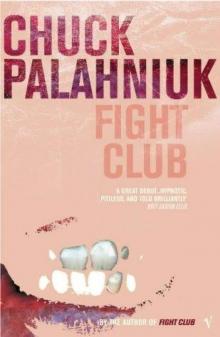 Fight Club
Fight Club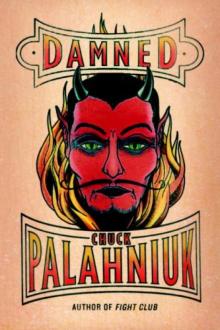 Damned
Damned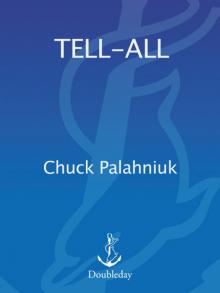 Tell-All
Tell-All Choke
Choke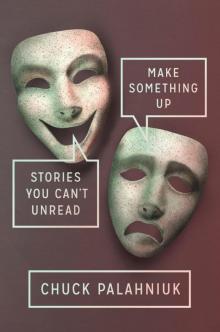 Make Something Up: Stories You Can't Unread
Make Something Up: Stories You Can't Unread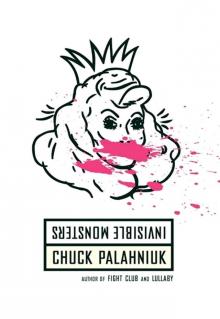 Invisible Monsters
Invisible Monsters Phoenix
Phoenix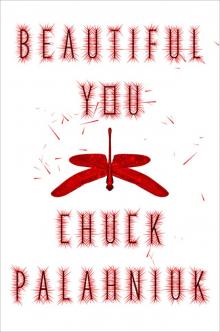 Beautiful You: A Novel
Beautiful You: A Novel Haunted
Haunted Survivor
Survivor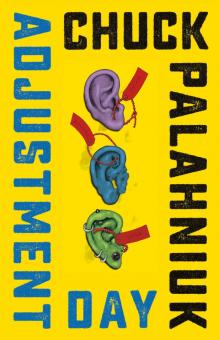 Adjustment Day
Adjustment Day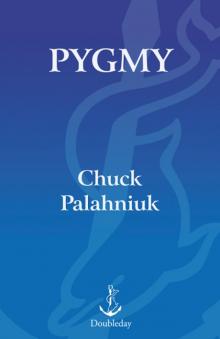 Pygmy
Pygmy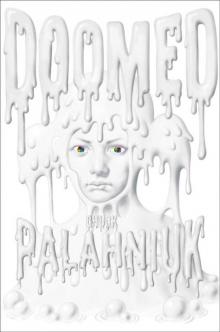 Doomed
Doomed Lullaby
Lullaby Snuff
Snuff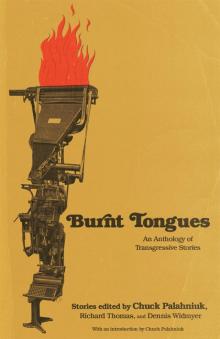 Burnt Tongues
Burnt Tongues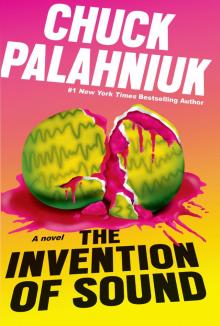 The Invention of Sound
The Invention of Sound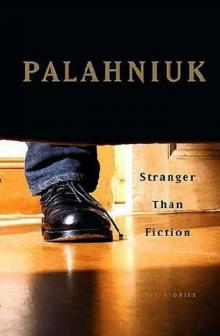 Stranger Than Fiction (True Stories)
Stranger Than Fiction (True Stories)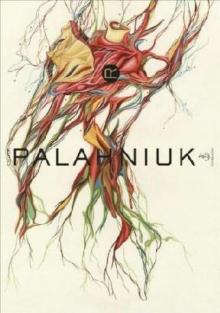 Rant: The Oral History of Buster Casey
Rant: The Oral History of Buster Casey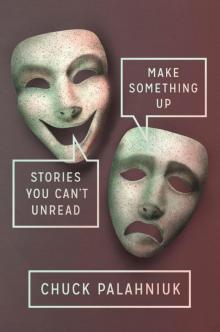 Make Something Up
Make Something Up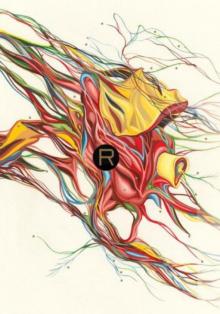 Rant: An Oral Biography of Buster Casey
Rant: An Oral Biography of Buster Casey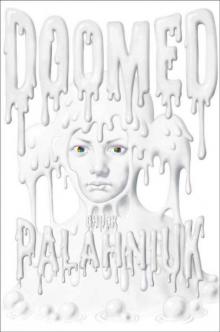 Doomed d-2
Doomed d-2 HOPE AND GORY
HOPE AND GORY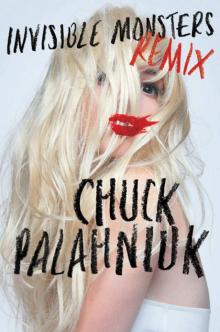 Invisible Monsters Remix
Invisible Monsters Remix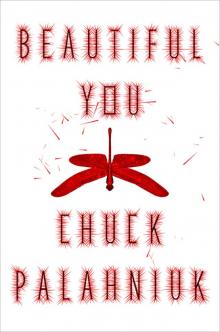 Beautiful You
Beautiful You Fugatives & Refugees
Fugatives & Refugees